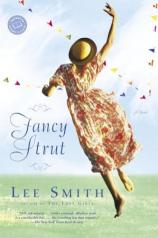Reading Group Guide
Discussion Questions
Fancy Strut

1. The title of this novel is Fancy Strut. What does the title of the book mean to you, both literally and figuratively? Does your interpretation of the title change as the book progresses? How?
2. Why do you think Lee Smith chooses to begin and end the book with Miss Iona? In which ways is she a symbol for the town of Speed and what it’s gone through over the festival period? How does her story interweave with that of Speed? What does she realize as the book progresses, both about the town and about herself?
3. The theme of appearance versus reality threads throughout Fancy Strut. How does the sesquicentennial Festival provide a showcase for this conflict? In which ways does it make a turning point within Speed? How does the involvement of the White Company, an outside organization that conducts the festival, bring this struggle to the surface? How is the White Company different from how it appears?
4. How do daydreams and imagination provide an outlet in Fancy Strut? Who in the town grapples with the conflict between fantasy and reality? In your opinion, are these fantasies healthy or unhealthy for those who have them? Who is most likely to turn his or her daydreams into reality, and why?
5. In which ways is Bob Pitt much different from how he appears to the outside world? What drives him toward his daydreams? How does his attitude toward his family, his role in the festival, and Sandy underscore his struggle?
6. "We have to preserve our anachronisms," Manly Neighbors tells Monica (page 64). In which ways is the town of Speed itself an anachronism, especially considering racial and social factors? How are certain oppositional forces in the town, such as Bill Higgins and Lloyd, emblematic of the fight between the status quo and modern changes? How does the balance of power shift as the novel progresses?
7. The book follows the thoughts and actions of many people in the town, including Bob Pitt, Monica, Bevo, Lloyd, and Buck Fire. What effect does this shifting point of view have on the story? How does this contribute to a cohesive narrative and to painting a complete picture of Speed? Is there one individual whom you view as the "voice" of the narrative? If so, who, and why?
8. In which ways is Monica Neighbors a typical smalltown wife and society lady? How does she chafe under these classifications? How does she express her ennui, both externally and in her daydreams?
9. Discuss the evolution of Ruthie. What is her motivation for entering the Queen pageant? In which ways does this action change her life? Why is Ron the Mouth so taken with her? Why do you think she succumbs, finally, to his advances—is she in love, or are her feelings more pragmatic in nature?
10. What does being Queen represent for each of the contestants? How do they see the crown as a gateway to bigger and better things? How do organizers spin the election process as fair and democratic? Is it really? In your opinion, is the right person chosen as queen? Why or why not?
11. Why does Buck Fire appeal to the women of the town? What, originally, does Monica think of him, and how does her mind change as the book progresses? Why does Monica want to have a baby by the end of the book? Do you think she’s truly tired of herself, as she says? Why or why not?
12. What significance does the housing suit brought festival and for the town as a whole? What motivates both Theolester and Chall toward the suit? In which ways are they idealistic, and in which ways pragmatic? Why do you think Lloyd becomes their lawyer? How do others in the town, particularly the mayor, react to the nascent civil rights movement, both in the town and in the nation?
13. Why does Miss Iona write obituaries for the majorettes, and for Sandy, Frances, and Manly? Why does this group inspire such particular contempt from her? How is each symbolic of a changing world that she neither likes nor understands?
14. How does the fire at the pageant galvanize the town? Why does Bevo set it in motion? Does Sharon perceive Bevo differently after the fire? How is the looting of the town significant? Does it portend larger national events to come?
15. What do you think happens to the characters in Fancy Strut after the Sesquicentennial and fire? Whom can you see leaving Speed to embark upon a new life? Who would be most likely to attempt to remain in the town and maintain the status quo? Why?
Fancy Strut
- Publication Date: September 29, 1996
- Paperback: 343 pages
- Publisher: Ballantine Books
- ISBN-10: 0345410394
- ISBN-13: 9780345410399







